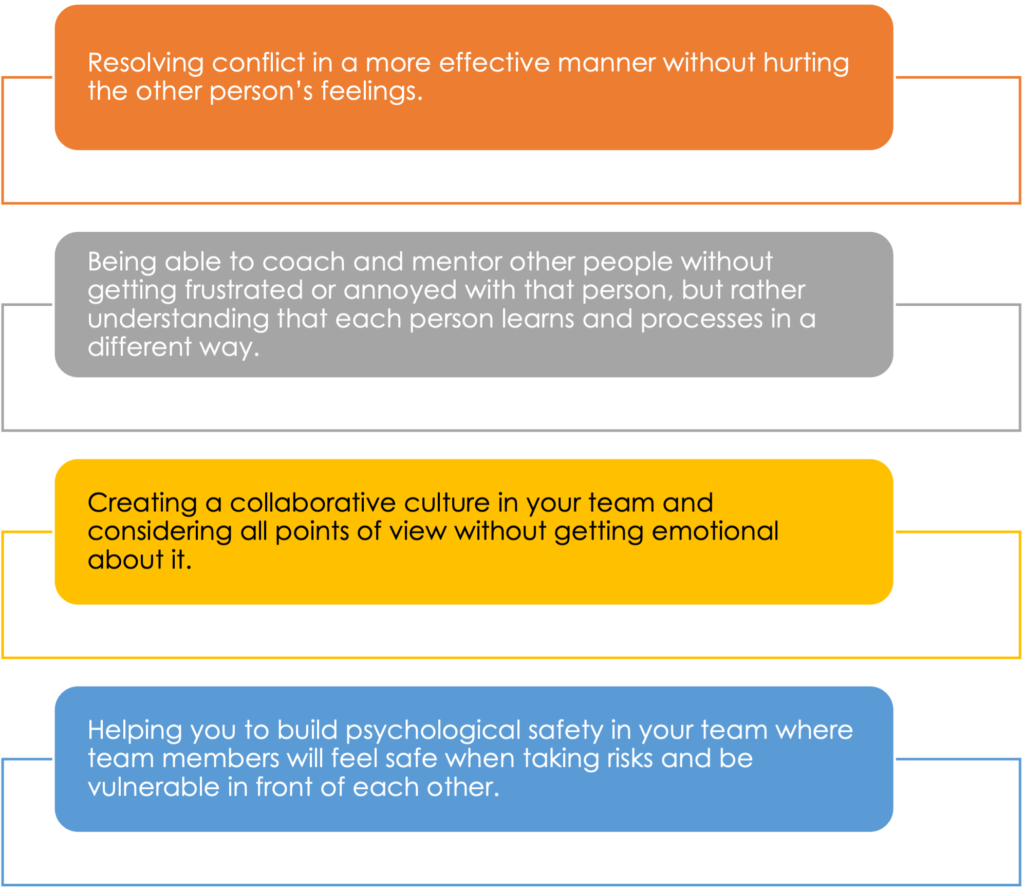By Carli Uys
Head of Marketing, Research and Development (MCom Industrial Psychology and MCom Communication studies)
What is emotional intelligence?
Emotional Intelligence gives you the ability to understand, manage, and use your own emotions in a positive way to relieve stress, to communicate effectively, empathise with others, overcome challenges and to defuse conflict. People who have a high degree of emotional intelligence know and understand their feelings, what their emotions truly mean, and how their emotions impact other people and themselves. Emotionally intelligent leaders are essential for the success of an organisation. Forward-thinking organisations cultivate the skill of emotional intelligence in their leaders and teams to strengthen the relationships they have with one another as well as with their customers.
Leaders who have high emotional intelligence are able to create more connected and motivated teams. Leaders who possess emotional intelligence have a different set of skills that make them effective leaders. These skills include the ability to inspire others, personal integrity, communication skills and comfort with building relationships.
Emotional intelligence is a key differentiator in achieving excellence in employee engagement, product innovation, and customer experiences. It also helps the leader and team members to cope better during challenging times, to succeed in their work and to achieve their personal and professional goals. Emotional intelligence is particularly valuable for a team to understand each other’s emotions, feelings and to help them to make better decisions.
Why is emotional intelligence important?
Science has found that emotions precede thoughts. When you let your emotions run high, then your emotions will change the way your brain functions:

Being able to understand and manage your emotions (and the emotions of others) will help you to be more successful in both your personal and professional life.
Having emotional intelligence can help you on a personal level by:

Having emotional intelligence can help you on a professional level by:

Applying emotional intelligence to leadership is quite natural. Managers and business leaders are responsible for overseeing employees, developing their skills and maximising their performance, and understanding the crucial role emotions play. Emotional intelligence covers several critical skills that businesses and teams need to function, such as communication, conflict resolution, pursuing excellence and more.
The importance of emotional intelligence in leadership
Daniel Goleman said “If your emotional abilities aren’t in hand, if you don’t have self-awareness, if you are not able to manage your distressing emotions, if you can’t have empathy and have effective relationships, then no matter how smart you are, you are not going to get very far.” It has been found that the science behind emotional intelligence in the workplace is of utmost importance and it has a major impact in the business world. This means that emotional intelligence can determine business success. Likewise, the absence of emotional intelligence can lead to basic, preventable failures. Fortunately, emotional intelligence can be improved, and in doing so, it will help you to become a better leader.
Part 2 of this blog post series will look at how emotional intelligence affects your work, your physical health, your mental health, your relationships and your social intelligence. The blog will also look at the different traits most successful leaders possess. Part 3 will look at the 5 key elements of emotional intelligence as identified by Daniel Goleman. Part 4 will look at four skills a leader can focus on to increase his/her emotional intelligence and the twelve emotional intelligence competencies that are embedded in the 4 skills.